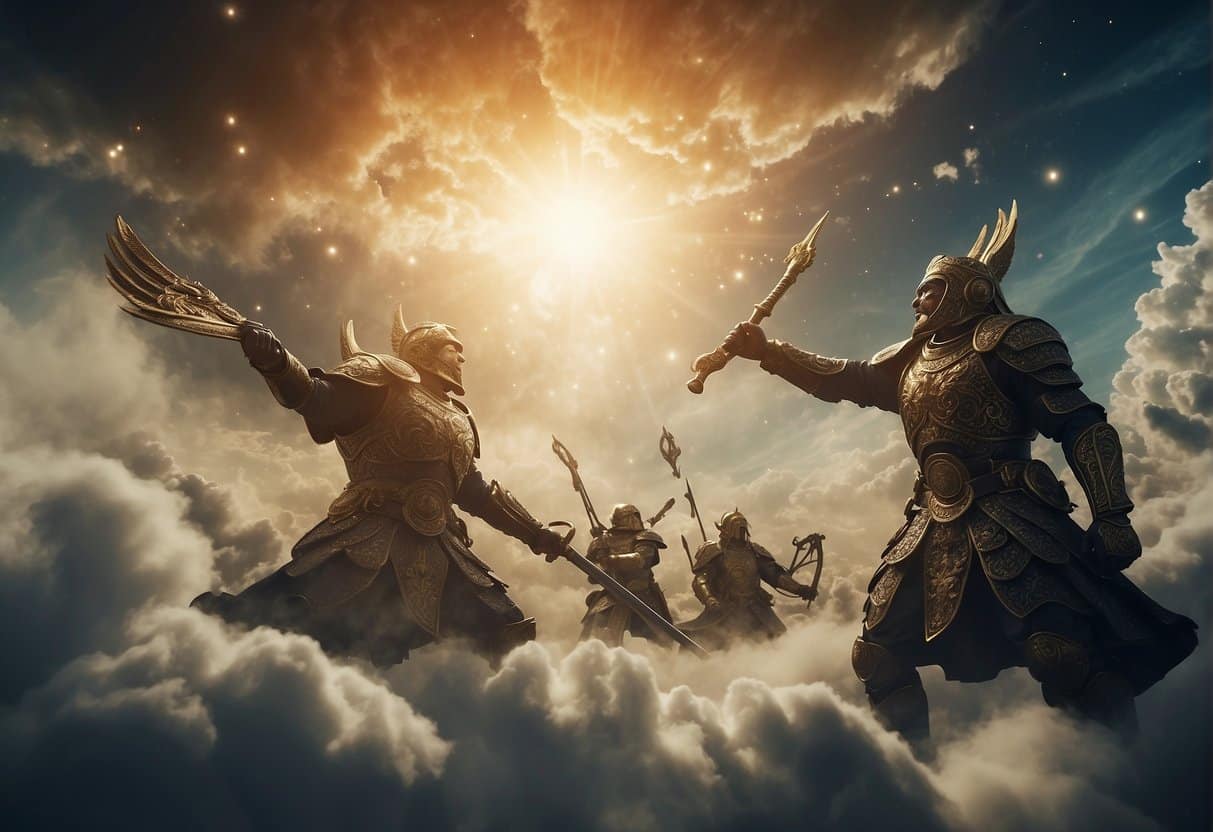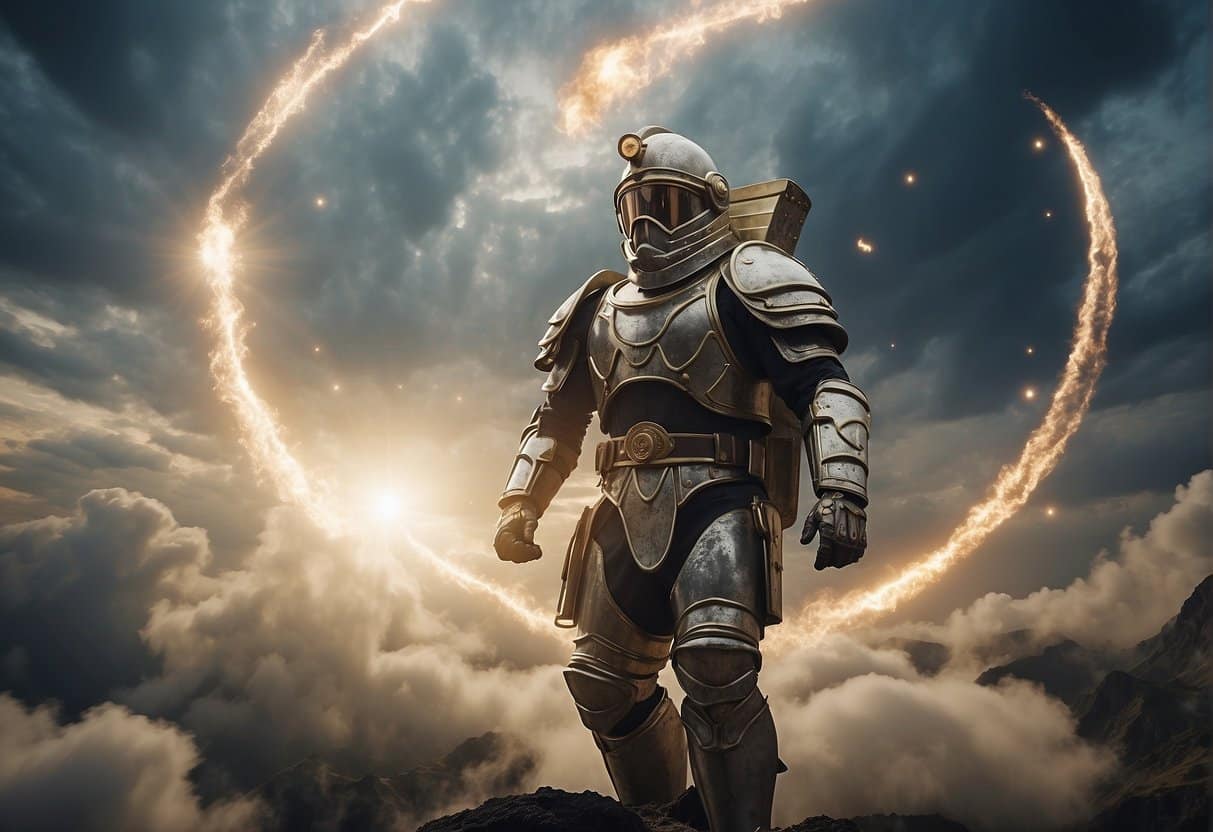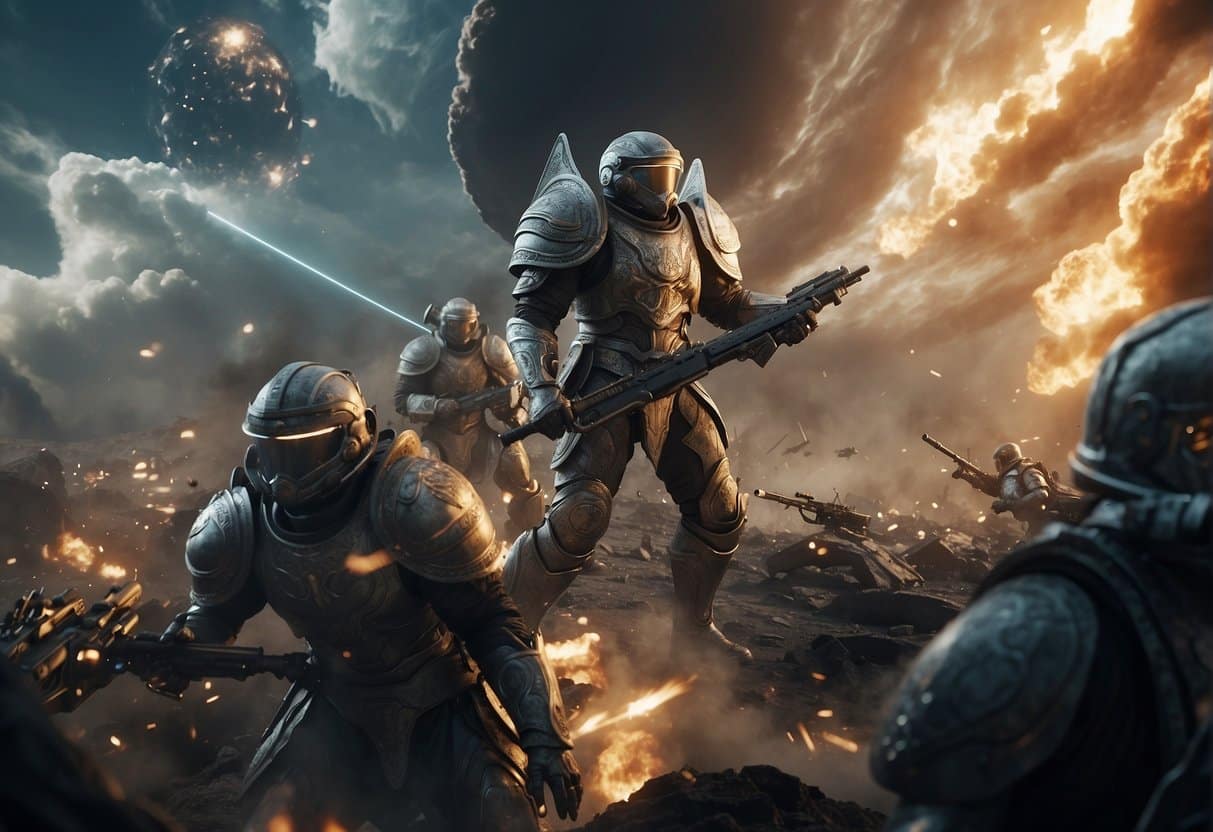If you’re wondering how long did the War in Heaven last, you’re not alone. This topic has been the subject of much speculation and debate over the years.
According to traditional Christian cosmology, the War in Heaven was a mythical conflict between two groups of angels.
It is attested in the Book of Revelation, alongside proposed parallels in the Hebrew Bible and the Dead Sea Scrolls.
While the exact duration of the conflict is not specified in these texts, some scholars have attempted to estimate its length based on various clues and references.

One popular interpretation of the War in Heaven is that it represents a cosmic battle between God and Satan, with the angels serving as their respective armies.
In this view, the war is seen as a struggle for control over the universe and the souls of humanity.
Other interpretations suggest that the war was a more localized conflict, possibly involving only a small group of angels or a specific region of the spiritual realm.
Regardless of the specific details, the War in Heaven remains a fascinating and important topic for many people of faith and scholars of religion alike.
So, how long did the War in Heaven last? While there is no definitive answer to this question, some sources suggest that the conflict may have lasted for millions or even billions of years.
Some versions of the War in Heaven story describe a prolonged battle between the angels, with neither side gaining a clear advantage for a very long time. Other sources suggest that the conflict was relatively brief, perhaps lasting only a few days or weeks.
Yet, the true duration of the War in Heaven may never be known for certain, but its impact on religious and cultural history is undeniable.
Biblical Account of the War in Heaven
Revelation’s Narrative
The war in heaven is described in the book of Revelation, which is the last book of the New Testament.
Specifically, Revelation 12:7-9 states, “And there was war in heaven: Michael and his angels fought against the dragon; and the dragon fought and his angels, And prevailed not; neither was their place found anymore in heaven.
And the great dragon was cast out, that old serpent, called the Devil, and Satan, which deceiveth the whole world: he was cast out into the earth, and his angels were cast out with him.”
This passage describes a battle between Michael and his angels and the dragon (Satan) and his angels.
The battle results in Satan and his angels being cast out of heaven and onto the earth. However, the duration of the war in heaven is not specified in the Bible.
Symbolism in the Scripture
The war in heaven is often interpreted as a symbolic representation of the struggle between good and evil. The dragon is often seen as a representation of Satan, while Michael is seen as a representation of God’s power and authority.
The child and the woman mentioned in Revelation 12 are often interpreted as symbolic representations of Jesus and the church, respectively.
Additionally, the war in heaven is often seen as a precursor to the tribulation, which is a period of great suffering and turmoil that will occur before the end of the world.
The war in heaven is seen as a sign that the end times are near and that the tribulation is coming.
Theological Interpretation of War In Heaven
When it comes to the duration of the war in heaven, there are varying interpretations among theologians.
However, most agree that the war in heaven was a spiritual battle between God’s angels and Satan and his followers.
Some believe that this battle took place before the creation of the world, while others believe that it took place after the fall of man.
Role of Jesus Christ
In the Christian faith, Jesus Christ is considered the Messiah and Savior who defeated Satan and his followers. Some theologians believe that Jesus played a role in the war in heaven by casting out Satan and his followers.
They also believe that the war in heaven was a precursor to the ultimate victory of good over evil, which was achieved through Jesus’ death and resurrection.
Satan’s Rebellion and Fall
According to the Bible, Satan was once an angel in heaven who rebelled against God due to his pride.
He convinced one-third of the angels to follow him in his rebellion, leading to the war in heaven. However, they were ultimately defeated and cast out of heaven.
The duration of the war in heaven is not explicitly stated in the Bible, but some theologians believe that it lasted for a short period.
Others believe that it was an ongoing battle that continued until the fall of man.
Regardless of the duration, the war in heaven is considered a significant event in Christian theology, as it represents the battle between good and evil.
Historical and Prophetic Context

The war in heaven is a topic that has fascinated theologians and scholars for centuries. The concept of a war in heaven is mentioned in both the Old and New Testaments of the Bible.
It is generally believed that the war in heaven took place before the creation of the world. The war is said to have been fought between God and his angels against Satan and his followers.
Old Testament References
The concept of a war in heaven is mentioned in the book of Isaiah, where the prophet describes how Satan was cast out of heaven.
In Isaiah 14:12-15, Satan is referred to as the “morning star” and is described as having fallen from heaven.
The book of Ezekiel also refers to the fall of Satan, describing how he was cast out of heaven because of his pride and rebellion against God.
Eschatological Vision
In the book of Revelation, the war in heaven is described as an eschatological vision of the end of time. The book of Revelation describes how Michael and his angels fought against the dragon, and the dragon and his angels fought back.
The dragon is identified as Satan, who is described as having been hurled down to the earth along with his followers.
The war in heaven is seen as a prelude to the end times when Satan will be defeated and cast into the lake of fire.
The book of Revelation is filled with eschatological visions and prophecies. It describes the end times, the second coming of Christ, and the final judgment of all people.
The war in heaven is just one of the many prophetic events described in the book of Revelation.
Spiritual Warfare and Human Experience
When we think about the concept of warfare, we often think about physical battles that take place between two or more opposing forces.
However, there is another type of warfare that takes place, one that is spiritual.

This type of warfare is between good and evil, and it is an ongoing battle that has been taking place since the beginning of time.
The Struggle Between Good and Evil
The struggle between good and evil is something that we all experience in our lives. It is the battle between doing what is right and what is wrong.
This battle is not just a mental one, but it is also a spiritual one. It is a battle that takes place within our hearts and minds, and it is one that we must fight every day.
Sin is what causes the struggle between good and evil. It is the act of going against what is right and doing what is wrong. Sin entered the world when Satan tempted Eve in the Garden of Eden.
This act of disobedience resulted in the distortion of God’s perfect creation and the introduction of evil into the world.
The Influence of Demonic Forces
Demonic forces are another aspect of spiritual warfare that we must be aware of. These forces are the fallen angels who chose to rebel against God and follow Satan.
They are the ones who slander and oppose God’s plan for humanity, and they are constantly working to lead us away from God.
However, we must remember that we have agency and freedom of choice. We have the power to choose whether we will follow God or the devil. We can choose to resist the temptations of Satan and follow the path that God has set before us.
In the end, we must remember that we are not alone in this battle. We have the testimony of those who have gone before us, and we have the blood of the Lamb that gives us victory over sin and death.
We must be strong and stand firm in our faith, knowing that God is with us and that we will ultimately emerge victorious.
Cultural and Mythological Analogues
Comparative Mythology
The War in Heaven is a recurring theme in many mythologies and religions. In Christianity, it is a conflict between God’s angels and Satan’s followers. In Hinduism, it is a battle between the Devas and Asuras.
In Norse mythology, it is a war between the Aesir and Vanir. These stories often feature a struggle between good and evil, light and darkness, or order and chaos. The duration of these wars varies across different mythologies.
Literary and Artistic Depictions
The War in Heaven has also been a popular theme in literature and art. In John Milton’s “Paradise Lost,” is a battle between the forces of God and Satan, with the Archangel Michael leading the charge against the rebel angels.
The war is depicted as a violent and chaotic conflict that lasts for many years. In the Warhammer 40,000 universe, the War in Heaven is a conflict between the Necrons and the Old Ones that lasted for millions of years.
It was followed by the Unification Wars, the Great Crusade, the Horus Heresy, and the Great Scouring.
The Aeldari, also known as the Eldar, are a race of psychic beings in the Warhammer 40,000 universe. They were once a powerful civilization that fell into decline after the War in Heaven.
Their fate is explored in the novel “The Infinite and the Divine” by Robert Rath. The book reveals that the Aeldari were once a spacefaring race that fought the Necrons and the Star Gods.
They were ultimately defeated and forced to flee to the Webway, a network of tunnels that allowed them to travel faster than light.
The Necrons are a race of robotic beings in the Warhammer 40,000 universe. They were once the Necrontyr, a flesh-and-blood race that was dying due to a cosmic mismatch between their bodies and souls.
They made a pact with the Star Gods, who promised to give them immortal bodies in exchange for their loyalty. The Necrons rebelled against the Star Gods after the War in Heaven and shattered them into shards.
They then hibernated millions of years before awakening in the 41st millennium.
Conclusion
The War in Heaven is a recurring theme in many mythologies and religions. It has been depicted in literature and art as a violent and chaotic conflict that lasts for many years.
In the Warhammer 40,000 universe, it was a conflict between the Necrons and the Old Ones that lasted for millions of years and had far-reaching consequences for the galaxy.
